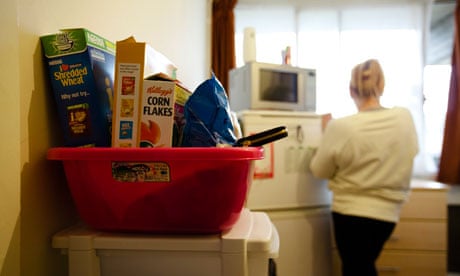The number of people officially classed as homeless in England has jumped by 14% – the biggest increase for nine years – as what charities have described as a "perfect storm" of rising repossession rates and unemployment drives thousands more families into temporary accommodation.
Across England, 48,510 households were accepted as homeless by local authorities in 2011, according to figures published by the Department for Communities and Local Government on Thursday.
The data shows 69,460 children or expected children are in homeless households, with three-quarters of the households accepted containing children.
Homelessness had been going down since 2003, with a small increase in 2010, and the scale of this rise has shocked housing campaigners.
Leslie Morphy, the chief executive of Crisis, said: "Our worst fears are coming to pass. We face a perfect storm of economic downturn, rising joblessness and soaring demand for limited affordable housing combined with government policy to cut housing benefit plus local cuts to homelessness services."
But the housing minister, Grant Shapps, said the figures were still half the average rate seen under Labour and blamed "the debt-laden economy we inherited [which] is leaving a legacy of hard-up households across the country".
He said the government had made an extra £70m available to councils in the past year to assist households facing the prospect of homelessness.
The figures show a 44% increase in households who are homeless after repossession, with the number rising to 1,520. But this is still a relatively small part of the whole picture, and the biggest proportion – 20% – are those who can no longer stay with a friend or a relative.
In the last three months of 2011, 12,830 households were accepted as homeless, up 18% on the same period the previous year.
"These figures are a shocking reminder of the divide between the housing haves and have nots in this country," Campbell Robb, the chief executive of Shelter, said.
"Amid growing economic gloom and rising unemployment, increasing numbers of ordinary families are falling victim to our housing crisis. Some may be priced out of the housing market, forced to bring up their families in a revolving door of private let after private let."
The figures come days after official statistics showed the number of rough sleepers in England had gone up by one-fifth.
The statistics show households that local authorities have recognised are unintentionally homeless and have accepted a duty to house. Increasingly, people are being put up in bed and breakfast accommodation, with the use of this arrangement up 37% on the previous year after years of decline.
Councils are not encouraged to place families in B&Bs, and there is a six-week time limit.
Shelter says the increased use is a sign of the shortage of suitable accommodation as the figures also show a decrease in the use of accommodation leased by the private sector to local authorities, by 6% from 27,730 to 26,080 households, so B&B will often be the only option.
In fact, 8,540 households are homeless because their short lease came to an end, up 39% on 2010. Under the new Localism Act, councils will be able to discharge homeless households into the private rented sector against their will by offering them temporary accommodation rather than finding them a settled home.
The shadow housing minister, Jack Dromey, said the rise was "inevitable".
"The remorseless rise in homelessness shows how out of touch this government is with the human impact of its economic and housing policies. It is an absolute tragedy that in 2012 so many families do not have a home they can call their own."
Birmingham has the highest number of homeless people, with 925 households, but the highest rate in England is in Waltham Forest, north-east London, where 2.55 households per 1,000 were accepted as homeless in the last three months of 2011, compared to an England figure of 0.59. Across London, homelessness is up by 27.4%.
The full force of the housing benefit cuts – which come in for a million existing claimants from 1 January – is yet to be felt. However, housing campaigners say the cuts may be reflected in the figures because some landlords will be terminating contracts and taking the decision not to renew tenancies in anticipation.


Comments (…)
Sign in or create your Guardian account to join the discussion